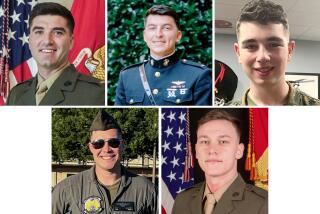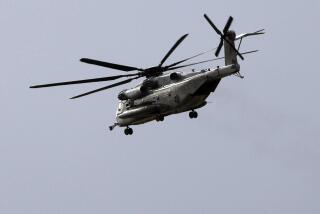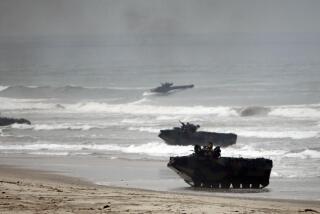AN UNSEEN ENEMY
- Share via
Abu Hardan, Iraq — The Marines of Kilo Company were on the fourth day of an offensive against insurgents in western Iraq, but they had seen little action Wednesday until a loud boom rocked this Euphrates River village, followed by the frantic screams of young troops.
They stopped their convoy and looked back to see an amphibious vehicle engulfed in flames. They knew that about 18 Marines from Lima Company of the 3rd Battalion, 25th Regiment, were in the vehicle, which had apparently struck a roadside bomb.
Within minutes, the vehicle’s gas tanks exploded, setting off mortar shells, grenades, bars of C-4 plastic explosives and thousands of machine-gun rounds inside. Rockets randomly shot out of the vehicle. The explosives would crackle and thunder for the next hour.
Marines from Kilo, traveling 500 yards ahead of Lima, rushed to rescue their comrades trapped inside the burning wreck. A Times reporter traveling with Kilo Company followed them.
Some troops ran through thick, black smoke and pulled out wounded men, lining up some of them within feet of the fire.
Some of the wounded suffered third-degree burns. Seared flesh hung from their bodies. Most of the wounded had severe burns on their arms and faces. Others had shrapnel wounds. A 3-inch shard of metal protruded from one Marine’s abdomen.
Marines who survived the blast said they believed that four troops died in the vehicle. Officials on the scene and in Baghdad declined to confirm the casualty toll.
Lt. Sam McAmis, who commanded a Marine platoon in the operation, recounted trying to pull a wounded sergeant from the fire, but the man’s ammunition pouch was stuck in the vehicle’s hatch. McAmis said he yanked him out.
“When he came out, my hand was inside his leg, inside his muscle,” he said.
Another wounded man inside was not as lucky.
“One of my lance corporals went in to try to get some more people, but there was too much fire,” McAmis said. “One Marine had burns over his face. The last thing he did was reach his hand out and an explosion went off” -- killing him.
Sgt. Dennis Wollard of Biloxi, Miss., who survived the explosion, sat glassy-eyed and bare-chested against a building on the edge of the field. He lamented that he couldn’t save all the men inside.
“I was at the back door,” Wollard said. “I couldn’t get ‘em all. There had to be six still in there. I don’t know how they could’ve gotten out.”
Another Marine, speaking with a senior officer, held back tears. “I couldn’t get to them all, sir. It was just too hot,” he said, shaking his head.
As the Marines treated their wounded comrades, retired Marine Lt. Col. Oliver North, the Iran-Contra scandal figure, filmed the operation with a digital video recorder issued by his employer, Fox News. North, who was dressed in Marine camouflage, is traveling with Kilo Company.
About half an hour after the explosion, two Black Hawk helicopters swooped down to take the wounded to the base at Al Qaim near the Syrian border.
The Marines in Abu Hardan stood near the blast scene. Some appeared stunned. Others were angry.
“It was my fault, it was my fault!” shouted a Marine who identified himself as the driver of the amphibious vehicle. He appeared to be uninjured.
Wednesday was the fourth day of a major U.S. assault to rid remote western Iraqi villages of guerrillas. More than 1,000 troops are participating in the offensive.
Since Sunday, Marines said they had killed at least 110 insurgents. Three Americans had been killed and 25 wounded before the attack on the amphibious vehicle. About 20 Lima Company Marines have been killed or wounded since the fighting began.
Kilo Company had spent most of Wednesday sweeping through this village of farms and two-story stone houses along the Euphrates.
They wanted to take control of the Ramana Bridge, where Marines this week took heavy fire from insurgents. Immediately after entering the town, they found a house with a red van parked in a carport. Wires hung out of the gas tank, often a sign of a vehicle bomb.
“We took constant mortar fire from over here. Anybody who comes over that bridge gets lit up,” said 3rd Platoon commander Lt. Joseph Clemmey, 26, of Worcester, Mass. “This was supposed to be the mission from God, and so far we’ve been out here and we haven’t seen nothing. This was the climactic moment we were all waiting for, and no one is here.”
Two eight-wheeled light armored vehicles broke out of the convoy to train their heavy guns on the vehicle.
“Yeah!” one eager Marine called out.
A few moments later, the guns pounded the van into flames. The rounds burst holes through the front of a nearby house.
A few blocks to the south, rebel fighters fired on Marines. Troops manning tank-mounted machine guns fired back. The rounds blasted holes through a house on the far side of a field.
When the shooting stopped, Marines blared warnings in Arabic from loudspeakers atop a Humvee, demanding that the villagers leave their homes and surrender.
Men in traditional dishdasha robes, women carrying babies, youths in basketball shorts and an old man with a walking stick emerged from their homes and began walking toward the Marines with their hands raised. Several residents waved white flags out of their windows.
Clemmey ordered his men to search the people and put them in a walled-off garden.
“Our house is beside the river. Some people we didn’t know came and entered our house and shot from the house. And then the Americans shot at us,” said Hassan Rashash, a retired local government official who was sitting against the wall.
He was exasperated. “We cannot go, this is our home. We fight them. We argue. We tell them, ‘We have women. We have children.’ But we cannot force them to go. What can we do?” he complained.
“You know this is the main road. From here the terrorists come from Syria, and they can go all the way to Mosul,” said Mohammed Salah Sulayman, a retired professor who was also being detained. “The terrorists, they move into our houses in the night. We can’t do anything. Most of these people here came to my house because they can’t go to their own homes.”
Other residents also described, in halting English, how foreign fighters intimidated the community.
“Most people here are like me,” Rashash said. “You can’t love these people who come in your house, in your garden. Who would want this? We are glad the Americans are here.”
Clemmey’s platoon was followed by a tank. Its main barrel bore its moniker: Stink Fist.
“Remember,” Clemmey shouted to his troops in a New England accent, “anyone who has not left the city can be considered hostile.”
Marines fanned through waist-high wheat fields looking for mines and bombs. Locked doors were kicked in or blown through with explosive charges. Cabinets were opened and clothes bags emptied in the search for weapons and bomb-making equipment.
But the city was deserted.
“We’re fighting an invisible enemy,” said Sgt. Jeffrey Swartzentruber of Ft. Lauderdale, Fla. “They’re like the ... CIA.”
More to Read
Sign up for Essential California
The most important California stories and recommendations in your inbox every morning.
You may occasionally receive promotional content from the Los Angeles Times.










